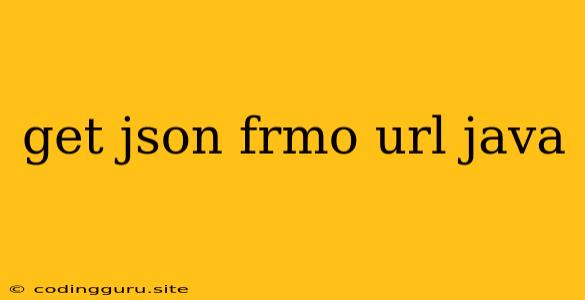Fetching JSON Data from a URL in Java
Retrieving data from a remote server in JSON format is a common task in Java applications. This process involves establishing a connection to the URL, retrieving the data, and parsing it into a usable format. Let's explore how to achieve this using Java.
Understanding the Process
Before diving into the code, let's understand the key steps involved:
- Establish a Connection: The first step is to establish a connection to the URL from which you want to fetch the JSON data.
- Read Data: After establishing the connection, you need to read the raw data from the URL.
- Parse JSON: The retrieved data is in JSON format, so you need to parse it into a Java object. This allows you to access and use the data effectively.
Java Code Example
Let's implement a simple example to demonstrate the retrieval and parsing of JSON data using the popular HttpURLConnection class in Java:
import java.io.BufferedReader;
import java.io.InputStreamReader;
import java.net.URL;
import java.net.URLConnection;
import org.json.JSONObject; // Assuming you're using the org.json library
public class FetchJsonFromUrl {
public static void main(String[] args) throws Exception {
String urlString = "https://api.example.com/data"; // Replace with your actual URL
URL url = new URL(urlString);
URLConnection connection = url.openConnection();
BufferedReader in = new BufferedReader(
new InputStreamReader(connection.getInputStream()));
String inputLine;
StringBuilder response = new StringBuilder();
while ((inputLine = in.readLine()) != null) {
response.append(inputLine);
}
in.close();
JSONObject jsonObject = new JSONObject(response.toString());
// Access data within the JSON object
String name = jsonObject.getString("name");
int age = jsonObject.getInt("age");
System.out.println("Name: " + name);
System.out.println("Age: " + age);
}
}
Explanation:
- Import necessary classes: Import the required classes for HTTP connections and JSON parsing.
- Create a URL object: Create a
URLobject representing the URL from which you want to fetch the data. - Open a connection: Open an
URLConnectionusing theopenConnection()method. - Read data: Read the response data using a
BufferedReader. - Parse JSON: Use a JSON library like
org.jsonto parse the response data into aJSONObject. - Access data: Access the desired data elements within the parsed JSON object.
Tips for Fetching JSON from a URL
Here are some useful tips for making your JSON data fetching more efficient and robust:
- Error handling: Implement proper error handling to catch potential exceptions like
IOException,MalformedURLException, and JSON parsing errors. - Connection timeout: Set a timeout for the connection to avoid indefinite waiting in case of network issues.
- HTTP headers: Use the
URLConnectionobject to set appropriate HTTP headers, such asAccept,Content-Type, orAuthorizationfor authentication. - Libraries for JSON parsing: Explore other popular JSON parsing libraries like Gson, Jackson, or FasterXML for alternative parsing options.
Troubleshooting Common Issues
If you encounter problems fetching JSON data from a URL, consider the following troubleshooting steps:
- Check URL: Ensure that the URL is correct and accessible.
- Network connectivity: Verify that your application has proper network connectivity.
- JSON format: Ensure that the data retrieved from the URL is valid JSON.
- Response codes: Inspect the HTTP response code to identify issues like 404 (Not Found), 403 (Forbidden), or 500 (Internal Server Error).
- CORS (Cross-Origin Resource Sharing): If the URL originates from a different domain than your application, check if CORS is enabled on the server.
Conclusion
Retrieving JSON data from a URL in Java is a fundamental operation in web development. By understanding the process, utilizing appropriate libraries, and implementing robust error handling, you can seamlessly fetch and process JSON data from remote servers to enhance your Java applications.
